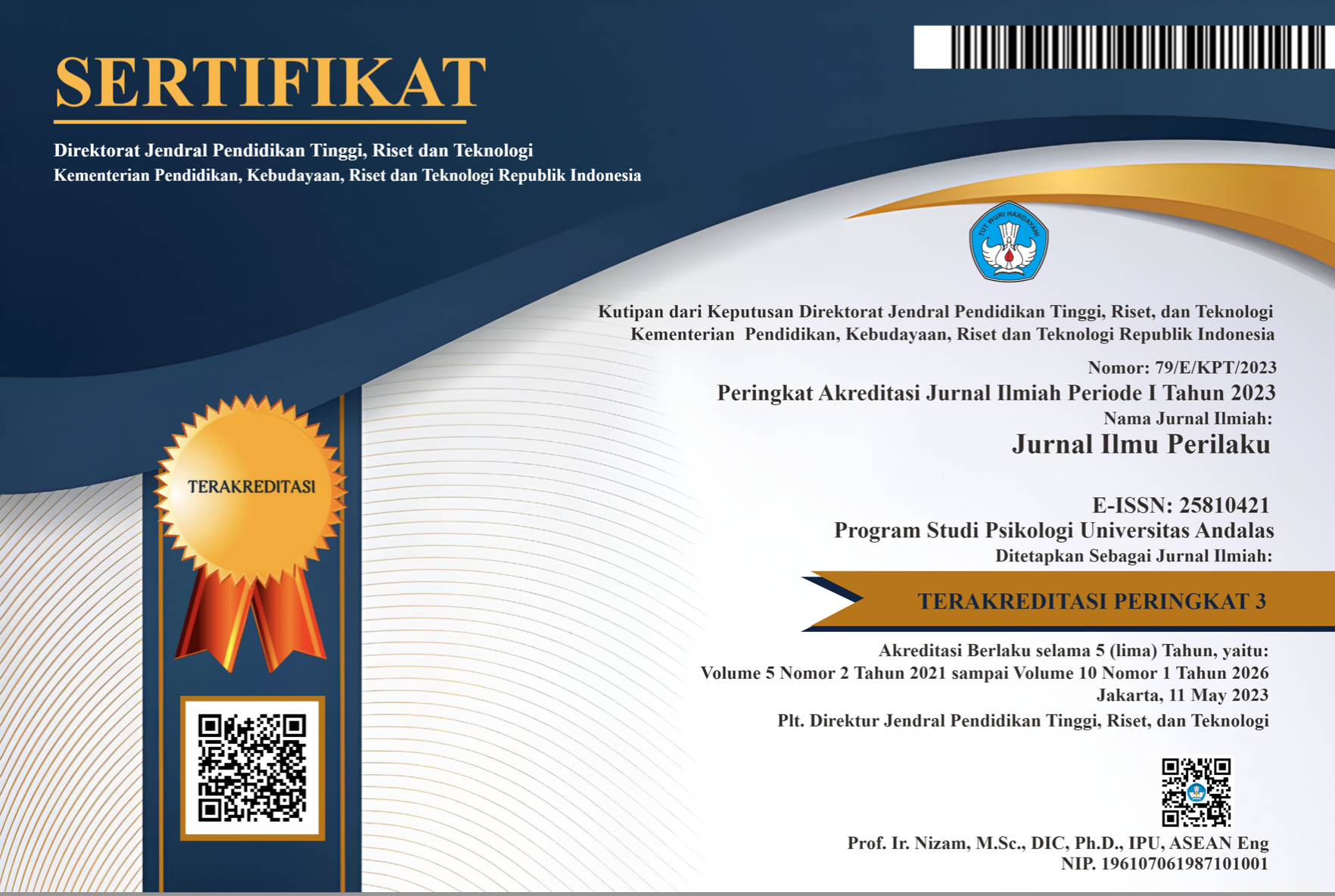Profil Kebutuhan Pengasuhan Anak pada Pasangan Muda
Abstract
Nowadays, there are many married couples in Indonesia who have not unable to nurture their children effectively. This study aims at developing curriculum on child nurturing for young couples to optimize their children’s growth. The implementation of the research will be done in multiyear. In the first year, the focus will be on the needs assessment on young couples related to some important issues. The subjects of the research will be 132 parents aged up to 30 years old who have been married for up to 5 years. The place of the research will be in four districts in DIY with focus group discussion (FGD) method as the main instrument. The FGD will be applied with Rapid Rural Appraisal (RRA) method. Data analysis using thematic analysis. The results showed that the profile of the young couple's needs on parenting consisted of five aspects: (1) the nurturing dimension consisting of physical, cognitive, and affective dimensions; (2) self-centered, child-centered, and parent-child parenting goals; (3) forms of care in the form of demand, control, response, and acceptance; (4) framework which includes nuclear family and extended family; and (5) how to overcome both internal and external parenting barriers.
Downloads
References
Aisyah, et.al.. (2008). Perkembangan dan Konsep Dasar Pengembangan Anak Usia Dini. Jakarta: Universitas Terbuka.
Alsheikh, N., Parameswaran, G, & Elhoweris, H. (2010). Parenting Style, Self-Esteem and Student Performance in the United Arab Emirates. Current Issues in Education, 13(1).Retrieved from http://cie.asu.edu
Badan Pusat Statistik. (2010). Profil Kriminalitas Remaja 2010. Jakarta:BPS
Brooks, Jane. (2011). The Process of Parenting. New York:McGraww-Hill Companies
Dix, T., Gershoff, E. T., Meunier, L. N., & Miller, P. C. (2004). The affective structure of supportive parenting: Depressive symptoms, immediate emotions, and child-oriented motivation. Developmental Psychology, 40, 1212–1227.
Fadlyana, E. & Larasaty, S. (2009). Pernikahan Usia Dini dan Permasalahannya. Sari Pediatri, 11(2), 136-140.
https://www.unicef.org/indonesia/id/Laporan_Perkawinan_Usia_Anak.pdf, diakses pada 22/01/2017 pukul 16.25
https://www.cafcass.gov.uk/grown-ups/parenting-plan.aspx, diakses 22/01/2017, pukul 19.32
http://www.harianjogja.com/baca/2016/11/01/pernikahan-dini-rawan-perceraian-dan-bunuh-diri-765203, diakses 06/03/2017, pukul 20.47
http://news.detik.com/berita/3261415/peneliti-ugm-pernikahan-dini-di-yogya-tak-selalu-karena-kasus-hamil-duluan, diakses 06/03/2017, pukul 20;57
Hurlock, E. (2002). Psikologi Perkembangan suatu Pendekatan Sepanjang Rentang Kehidupan. Jakarta: Erlangga.
Hurlock, E. B. (2002). Perkembangan Anak Jilid I. Jakarta: PT.Gelora Aksara Pratama.
Hoghughi, Masud.S., & Long, Nicholas. (2004). Handbook of Parenting : Theory and Research For Practice. Sage Publications.
Jacobs, F., Easterbrooks, A., Goldberg, J., Mistry, J., Bumgarner, E., Raskin, M., Fosser, N., Fauth, R. (2016). Improving Adolescent Parenting: Results from A
Randomized Controlled Trial of A Home Visiting Program for Young Families. American Journal of Public Health, 106(2), 342-349
Maccoby, E.E & Mcloby. (2008). The Two Sexes: Growing Up a Part, Coming Together. Cambridge: Harvard University Press
Nurani, A.S. (2004). Pengaruh Kualitas Perkawinan, Pengasuhan anak Anak dan Kecerdasan Emosional terhadap Prestasi Belajar Anak. Thesis. Institusi Pertanian Bogor.
Purnawati, Laily. (2015). Dampak Perkawinan Usia Muda Terhadap Pola Asuh Keluarga (Studi di Desa Talang Kecamatan Sendang Kabupaten Tulungagung). Jurnal Publiciana, 8(1), hal 53-70
Phillipson, S.,& McFarland, L. (2016). Australian Parenting and Adolescent Boys’ and Girls’ Academic Performance and Mastery: The Mediating Effect of Perceptions of Parenting and Sense of School Membership. J Child Fam Stud, 25, 2021–2033
Rakhmawati, Istina. (2015). Peran Keluarga dalam Pengasuhan anak Anak. Jurnal Bimbingan Konseling Islam. 6(1), h.1-18
Rasa, A.A. (2012). Tujuan Pengasuhan anak Anak oleh Bunda Elly Risman. http://deenscreens.tumblr.com/post/33069582896/tujuan-pengasuhan anak-anak-oleh-bunda-elly-risman
Sanders, M., (2012). Development, Evaluation, and Multinational Dissemination Of a Triple P-Positive Parenting Program. Annual Rev Clinical Psychology, 8:435-379
Santrock, J. W. (2012) Life span development. Alih bahasa: B. Widyasinta & N. I. Sallama. Jakarta: Penerbit Erlangga.
Siswanto, E., (2014). Pengasuhan anak Orang Tua Dalam Pembelajaran Nilai Moral Pada Anak Usia Dini Keluarga TKW Dalam Peer Group Bermain Di Dusun Ngepeh, Desa Sukorejo, Kecamatan Kebonsari, Kabupaten Madiun. Jurnal Ilmiah Pendidikan, 2(2), 167-173
Sumargi, A., Sofronoff, K. & Morawska, A. (2015). Understanding Parenting Practices and Parents Views of Parenting Programs: A survey Among Indonesian Parents Residing in Indonesia and Australia. Journal of Child and Family Studies, 24(1). 141-160. doi:10.1007/s10826-013-9821-3
Umargi, A., Sofronoff, K. & Morawska, A. (2015). A Randomized- Controlled Trial of the Triple P-Positive Parenting Program Seminar Series with Indonesian Parents. Child Psychiatry & Human Development. 46, Issue 4.pp 749-761.
Tavassolie, T., Dudding, S., Madigan, A, L., Thorvardarson, E., Winsler, A. (2016). Differences in Perceived Parenting Style Between Mothers and Fathers: Impication for Child Outcome and Marital Conflict. J Child Fam Stud, 25, 2055–2068
Turner, Erlanger, A., Chandler, Megan., & Heffer, Robert, W. (2009). The Influence of Parenting Styles, Achievement Motivation, and Self efficacy On Academic Performance in College Students. Journal of College Student Development, 50(3), pp. 337-346
Unayah, N & Sabarisman, M. (2015). Fenomena Kenakalan Remaja dan Kriminalitas. Jurnal Sosio Informa, 1 (2), 121-140.
Unnever, J.D., Cullen, F.T., & Agnew, R. (2006). Why is “Bad” Parenting Criminogenic?, Implications From Rival Theories. Youth Violence and Juvenile Justice, 4 (1), 3-33: DOI: 10.1177/1541204005282310
Yus, A. (2015). didikan Anak Usia Dini. Jakarta: Prenada Media Group.
The non-commercial use of the article is governed by the Creative Commons Attribution license as currently displayed on Creative Commons Attribution-NonCommercial-ShareAlike 4.0 International License.
JIP's spirit is to disseminate articles published are as free as possible. Under the Creative Commons license, JIP permits users to copy, distribute, display, and perform the work for non-commercial purposes only. Users will also need to attribute authors and JIP on distributing works in the journal.
Please find the rights and licenses in Jurnal Ilmu Perilaku (JIP).
- License
The non-commercial use of the article will be governed by the Creative Commons Attribution license as currently displayed on Creative Commons Attribution-NonCommercial-ShareAlike 4.0 International License.
- Author’s Warranties
The author warrants that the article is original, written by stated author(s), has not been published before, contains no unlawful statements, does not infringe the rights of others, is subject to copyright that is vested exclusively in the author and free of any third party rights, and that any necessary written permissions to quote from other sources have been obtained by the author(s).
- User Rights
JIP's spirit is to disseminate articles published are as free as possible. Under the Creative Commons license, JIP permits users to copy, distribute, display, and perform the work for non-commercial purposes only. Users will also need to attribute authors and JIP on distributing works in the journal.
- Rights of Authors
Authors retain the following rights:
- Copyright, and other proprietary rights relating to the article, such as patent rights,
- The right to use the substance of the article in future own works, including lectures and books,
- The right to reproduce the article for own purposes, provided the copies are not offered for sale,
- The right to self-archive the article.
- Co-Authorship
If the article was jointly prepared by other authors, the signatory of this form warrants that he/she has been authorized by all co-authors to sign this agreement on their behalf, and agrees to inform his/her co-authors of the terms of this agreement.
- Termination
This agreement can be terminated by the author or JIP upon two months’ notice where the other party has materially breached this agreement and failed to remedy such breach within a month of being given the terminating party’s notice requesting such breach to be remedied. No breach or violation of this agreement will cause this agreement or any license granted in it to terminate automatically or affect the definition of JIP.
- Royalties
This agreement entitles the author to no royalties or other fees. To such extent as legally permissible, the author waives his or her right to collect royalties relative to the article in respect of any use of the article by JIP or its sublicensee.
- Miscellaneous
JIP will publish the article (or have it published) in the journal if the article’s editorial process is successfully completed and JIP or its sublicensee has become obligated to have the article published. JIP may conform the article to a style of punctuation, spelling, capitalization, referencing and usage that it deems appropriate. The author acknowledges that the article may be published so that it will be publicly accessible and such access will be free of charge for the readers.










